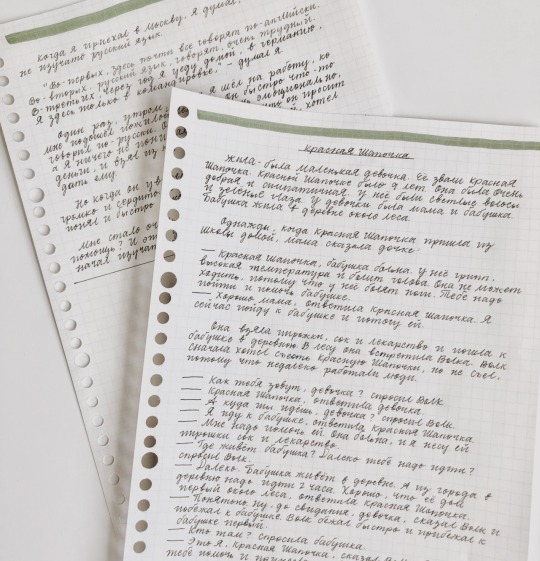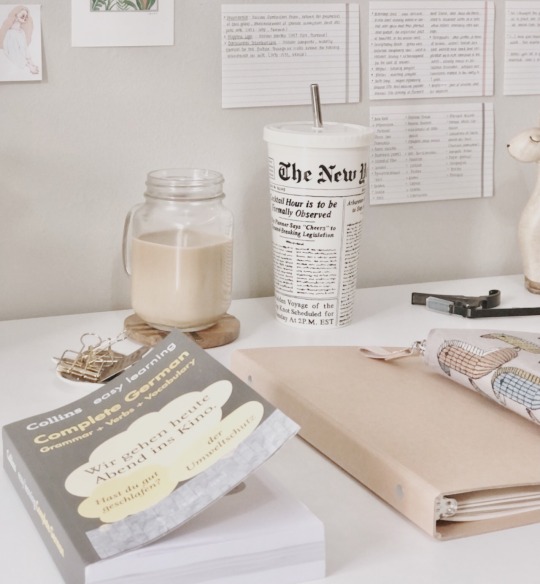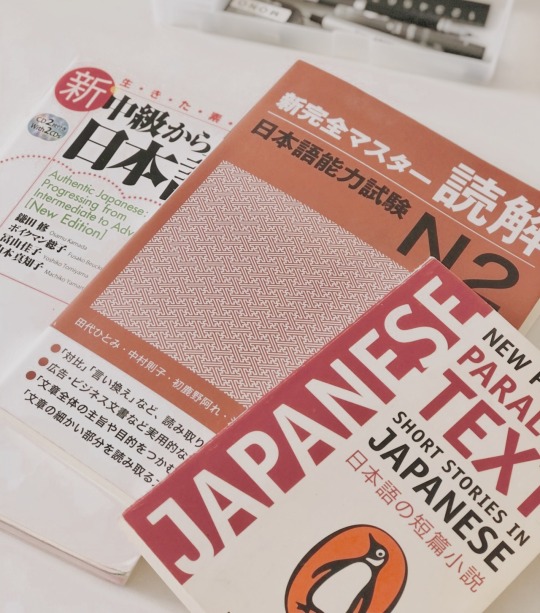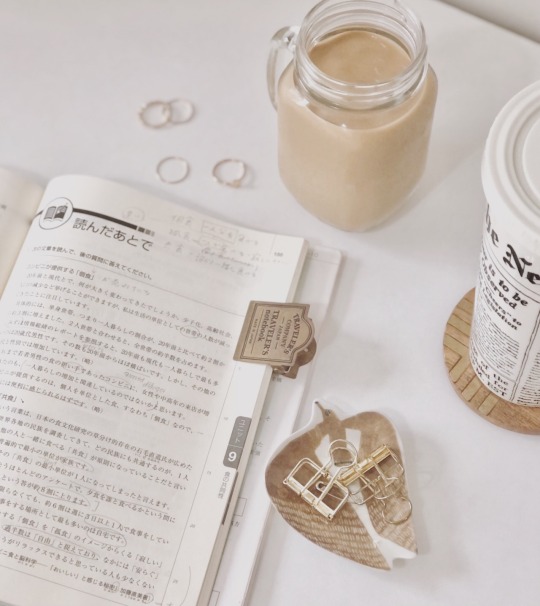JAPANESE STUDYBLR LANGBLR Preparing ourselves for the December JLPT. (Sideblog of Anne and Dan) Spanish natives.
Don't wanna be here? Send us removal request.
Text
Free Online Language Courses

Here is a masterpost of MOOCs (massive open online courses) that are available, archived, or starting soon. I think they will help those that like to learn with a teacher or with videos. You can always check the audit course or no certificate option so that you can learn for free.
American Sign Language
ASL University
Sign Language Structure, Learning, and Change
Arabic
Arabic Without Walls
Madinah Arabic
Moroccan Arabic
Armenian
Depi Hayk
Bengali
Learn Bangla (Register to see course)
Catalan
Parla.Cat
Speak Cat
Chinese (Mandarin)
Beginner
Chinese for Beginners
Chinese Characters for Beginners
Chinese for HSK 1
Chinese for HSK 2
Chinese for HSK 3 I & II
Chinese for HSK 4
Chinese for HSK 5
Mandarin Chinese Level I
Mandarin Chinese Essentials
Mandarin Chinese for Business
More Chinese for Beginners
Start Talking Mandarin Chinese
UT Gateway to Chinese
Intermediate
Intermediate Business Chinese
Intermediate Chinese Grammar
Mandarin for Intermediate Learners I
Dutch
Introduction to Dutch
English
Online Courses here
Resources Here
Faroese
Faroese Course
Finnish
A Taste of Finnish
French
Beginner
AP French Language and Culture
Elementary French I & II
Français Interactif
Vivre en France - A1
Vivre en France- A2
Intermediate & Advanced
French Intermediate course B1-B2
Passe-Partout
Travailler en France A2-B1
Vivre en France - B1
German
Beginner
Deutsch im Blick
German Project
German at Work
Goethe Institute
Gwich’in
Introduction to Gwich’in Language
Hebrew
Biblical Hebrew
UT Austin
Hindi
A Door into Hindi
Virtual Hindi
Icelandic
Icelandic 1-5
Indonesian
Learn Indonesian
Irish
Irish 101, 102, 103, 104, 105, 106, 107
Italian
Beginner
Beginner’s Italian I
Introduction to Italian
Intermediate & Advanced
AP Italian Language and Culture
Intermediate Italian I
Advanced Italian I
Japanese
Genki
Japanese JOSHU
Japanese Pronunciation
Marugoto Courses
Tufs JpLang
Korean
Beginner
First Step Korean
How to Study Korean
Introduction to Korean
Learn to Speak Korean
Pathway to Spoken Korean
Intermediate
Intermediate Korean
Norwegian
Introduction to Norwegian I, Norwegian II
Norwegian on the Web
Persian
Easy Persian
PersianDee
Polish
Online Course
Portuguese
Pluralidades em Português Brasileiro
Russian
Beginner
A1 Course
I speak Russian
Intermediate
B1 Course
B1+ Course
B2.1 Course
B2.2 Course
Spanish
Beginner
AP Spanish Language & Culture
Basic Spanish I, Spanish II
Spanish for beginners
Spanish for Beginners 1, 2, 3, 4, 5, 6
Spanish Vocabulary
Advanced
Corrección, Estilo y Variaciones
Leer a Macondo
Swahili
Online Course
Turkish
Online Course
Ukrainian
Read Ukrainian
Speak Ukrainian
Welsh
Beginner’s Welsh
Discovering Wales
Yoruba
Yorùbá Yé Mi
Multiple Languages
Ancient Languages
More Language Learning Resources & Websites!
Last updated: May 2019
215K notes
·
View notes
Photo


ig: herdrafts Learning grammar is the most annoying part for me, but also necessary to avoid common grammar mistakes in the writing. I found Chinese grammar easier? than Japanese, but the pronunciation it is not, actually both have strong and weak points but it all depends on your study method.
3K notes
·
View notes
Photo









my november in photos / always the beautiful answer who asks a more beautiful question. – e.e. cummings
3K notes
·
View notes
Photo


ig: herdrafts Since I’ve got a pen pal and I need to save paper, I transfer my Chinese and Japanese notes on these two notebooks. The pattern is still the same: dialogues, vocabulary and grammar. This morning I had a very sweet breakfast, I watched a subbed anime and I reviewed some past lessons I had forgotten I had forgotten.
3K notes
·
View notes
Photo


ig: herdrafts Learning grammar is the most annoying part for me, but also necessary to avoid common grammar mistakes in the writing. I found Chinese grammar easier? than Japanese, but the pronunciation it is not, actually both have strong and weak points but it all depends on your study method.
3K notes
·
View notes
Text
How to learn a language when you don’t know where to start:
General Plan:
Weeks 1 and 2: Purpose:
Learn the fundamentals sentence construction
Learn how to spell and count
Start building a phrase stockpile with basic greetings
The Alphabet
Numbers 1 - 100
Subject Pronouns
Common Greetings
Conjugate the Two Most Important Verbs: to be and to have
Basic Definite and Indefinite Articles
Weeks 3 and 4: Purpose:
Learn essential vocabulary for the day-to-day
Start conjugating regular verbs
Days of the Week and Months of the Year
How to tell the time
How to talk about the weather
Family Vocabulary
Present Tense Conjugations Verbs
Weeks 5 and 6: Purpose:
Warm up with the last of the day-to-day vocabulary
Add more complex types of sentences to your grammar
Colours
House vocabulary
How to ask questions
Present Tense Conjugations Verbs
Forming negatives
Weeks 7 and 8: Purpose:
Learn how to navigate basic situations in a region of your target language country
Finish memorising regular conjugation rules
Food Vocabulary and Ordering at Restaurants
Money and Shopping Phrases
Present Tense Conjugations Verbs
Weeks 9 and 10: Purpose:
Start constructing descriptive and more complex sentences
Adjectives
Reflective verbs
Places vocabulary
Weeks 11 and 12: Purpose:
Add more complex descriptions to your sentences with adverbs
Wrap up vocabulary essentials
Adverbs
Parts of the body and medical vocabulary
Tips for Learning a Foreign Language:
Learning Vocabulary:
What vocabulary should I be learning?
There are hundreds of thousands of words in every language, and the large majority of them won’t be immediately relevant to you when you’re starting out.Typically, the most frequent 3000 words make up 90% of the language that a native speaker uses on any given day. Instead try to learn the most useful words in a language, and then expand outwards from there according to your needs and interests.
Choose the words you want/need to learn.
Relate them to what you already know.
Review them until they’ve reached your long-term memory.
Record them so learning is never lost.
Use them in meaningful human conversation and communication.
How should I record the vocabulary?
Learners need to see and/or hear a new word of phrase 6 to 17 times before they really know a piece of vocabulary.
Keep a careful record of new vocabulary.
Record the vocabulary in a way that is helpful to you and will ensure that you will practice the vocabulary, e.g. flashcards.
Vocabulary should be organised so that words are easier to find, e.g. alphabetically or according to topic.
Ideally when noting vocabulary you should write down not only the meaning, but the grammatical class, and example in a sentence, and where needed information about structure.
How should I practice using the vocabulary?
Look, Say, Cover, Write and Check - Use this method for learning and remembering vocabulary. This method is really good for learning spellings.
Make flashcards. Write the vocabulary on the front with the definition and examples on the back.
Draw mind maps or make visual representations of the new vocabulary groups.
Stick labels or post it notes on corresponding objects, e.g when learning kitchen vocabulary you could label items in your house.
How often should I be practising vocabulary?
A valuable technique is ‘the principle of expanding rehearsal’. This means reviewing vocabulary shortly after first learning them then at increasingly longer intervals.
Ideally, words should be reviewed:
5-10 minutes later
24 hours later
One week later
1-2 months later
6 months later
Knowing a vocabulary item well enough to use it productively means knowing:
Its written and spoken forms (spelling and pronunciation).
Its grammatical category and other grammatical information
Related words and word families, e.g. adjective, adverb, verb, noun.
Common collocations (Words that often come before or after it).
Receptive Skills: Listening and Reading
Reading is probably one of the most effective ways of building vocabulary knowledge.
Listening is also important because it occupies a big chunk of the time we spend communicating.
Tips for reading in a foreign language:
Start basic and small. Children’s books are great practice for beginners. Don’t try to dive into a novel or newspaper too early, since it can be discouraging and time consuming if you have to look up every other word.
Read things you’ve already read in your native language. The fact that you at least know the gist of the story will help you to pick up context clues, learn new vocabulary and grammatical constructions.
Read books with their accompanying audio books. Reading a book while listening to the accompanying audio will improve your “ear training”. It will also help you to learn the pronunciation of words.
Tips for listening in a foreign language:
Watch films in your target language.
Read a book while also listening along to the audio book version.
Listen to the radio in your target language.
Watch videos online in your target language.
Activities to do to show that you’ve understood what you’ve been listening to:
Try drawing a picture of what was said.
Ask yourself some questions about it and try to answer them.
Provide a summary of what was said.
Suggest what might come next in the “story.”
Translate what was said into another language.
“Talk back” to the speaker to engage in imaginary conversation.
Productive Skills: Speaking and Writing
Tips for speaking in a foreign language:
If you can, try to speak the language every day either out loud to yourself or chat to another native speaker whether it is a colleague, a friend, a tutor or a language exchange partner.
Write a list of topics and think about what you could say about each one. First you could write out your thoughts and then read them out loud. Look up the words you don’t know. You could also come up with questions at the end to ask someone else.
A really good way to improve your own speaking is to listen to how native speakers talk and imitate their accent, their rhythm of speech and tone of voice. Watch how their lips move and pay attention to the stressed sounds. You could watch interviews on YouTube or online news websites and pause every so often to copy what you have just heard. You could even sing along to songs sung in the target language.
Walk around the house and describe what you say. Say what you like or dislike about the room or the furniture or the decor. Talk about what you want to change.This gets you to practise every day vocabulary.
Tips for writing in a foreign language:
Practice writing in your target language. Keep it simple to start with. Beginner vocabulary and grammar concepts are generally very descriptive and concrete.
Practice writing by hand. Here are some things you can write out by hand:
Diary entries
Shopping lists
Reminders
What could I write about?
Write about your day, an interesting event, how you’re feeling, or what you’re thinking.
Make up a conversation between two people.
Write a letter to a friend, yourself, or a celebrity. You don’t need to send it; just writing it will be helpful.
Translate a text you’ve written in your native language into your foreign language.
Write a review or a book you’ve recently read or a film you’ve recently watched.
Write Facebook statuses, Tweets or Tumblr posts (whether you post them or not will be up to you).
Write a short story or poem.
Writing is one of the hardest things to do well as a non-native speaker of a language, because there’s no room to hide.
There are lots of ways to improve your writing ability, but they can be essentially boiled down to three key components:
Read a lot
Write a lot
Get your writing corrected
28K notes
·
View notes
Text



[19/06/20]
On Monday I received my HP pen and I've been really productive with it! Since I've been really sick this week it's been a lot easier to study while in bed (which normally would be a big studyblr no-no lol)
I hope you all have been having a lovely week 💕
325 notes
·
View notes
Text


1/100 days of productivity
こんにちは!マーリーと申します。
hello! im marley. im a college freshman majoring in computer science. i love history (it might be my second major), literature not so much, and i love to learn. also にほんごおべんきょうしています (im studying japanese). i’ll be using this acc to track my studies through college; feel free to follow me!
495 notes
·
View notes
Text


1/100 days of productivity
こんにちは!マーリーと申します。
hello! im marley. im a college freshman majoring in computer science. i love history (it might be my second major), literature not so much, and i love to learn. also にほんごおべんきょうしています (im studying japanese). i’ll be using this acc to track my studies through college; feel free to follow me!
495 notes
·
View notes
Photo




ig: herdrafts Learning grammar is the most annoying part for me, but also necessary to avoid common grammar mistakes in the writing. I found Chinese grammar easier? than Japanese, but the pronunciation it is not, actually both have strong and weak points but it all depends on your study method.
3K notes
·
View notes
Photo


ig: herdrafts I usually study languages in the mornings at the weekend, I have more time to focus on learning and I also have more alone-time which I often do crave. My routine is almost the same; after making coffee and had breakfast I open my textbook and I start writing down the new lesson. This time I decided that I had to study Japanese, also I wanted to watch some subtitled anime episodes for listening practice. Don’t you think that Japanese sounds really cute?
3K notes
·
View notes
Text


Quarantine mood: quickly becoming a dalgona coffee enthusiast.
I miss my boyfriend and our dissertation afternoons in the cafeteria too much.
But the good side is that we now have dissertation appointments via webcam every afternoon. I'm making the dalgona to try to feel in my comfort zone.
99 notes
·
View notes
Text


A messy Japanese study sesh. Working through Genki I Lesson 12.
Ps.. I forgot which lake that is but it’s in the South Island of New Zealand somewhere.
2K notes
·
View notes
Text




2020.03.07 @ 神保町
“You can’t buy happiness, but you can buy books and that’s kind of the same thing.”
198 notes
·
View notes
Text
Reblog if you’re an active studyblr/langblr
My dash has been very dead recently
608 notes
·
View notes
Text
I just want to mind my business and speak 6 languages
55K notes
·
View notes
Photo

- I decided to say screw it all and slap down my current resources bc it’s getting out of hand (✿ᵒᵕᵒ) - bolded are my faves - my tagalog resources
頑張りましょう!
♡ DICTIONARIES ♡
語源由来辞典 etymology
故事ことわざ辞典 proverbs
日本語俗語辞書 colloquial language
Imiimiimi : slang
Jisho
JLect : search by dialect
Kanjikai
kotoba.ne.jp
日本語 eな
Tangorin
Weblio - シソーラス
♡ KANJI ♡
クルミの日本語
1,900 readings (on+kun)
All Kanji by grade
Kanji Koohii
Kanji level checker
Kun vs On
Learn Kanji fast
Moji.Tekkai: kanji in different styles
Radicals
Repeater (no readings!)
Radical cheat sheet
Riraikun
Suiren: words by kanji
Tobira: exercise sheets
Yojijukugo: 4-kanji compounds
♡ GRAMMAR ♡
日本語ください
Bc of Dreams: full list
Bite-sized grammar
By JLPT level (full list)
Find sentence examples
Maggie-sensei
Mistakes and differences
Particles
The ~small~ letters
300+ pages of grammar
♡ JLPT ♡
Grammar plan
Study plan
Level requirements
Level summaries
MLC: Short questions by grammar
Mock tests (ジェイグラム) (jtest)
N2 study (books)
♡ LEARNING ♡
みなと
ぷにぷに
Clozemaster (+ writing challenges)
Duo
General situations
Memrise
OnomatoProject
Quizlet
U-biq
Verb conjugator quiz
Vocabulary size quiz
YT: 国語-文法 (middle school grammar)
YT: N2 grammar
♡ READING/ LISTENING / WATCHING ♡
Apps for a language partner
Bookmeter (Japanese Goodreads)
Media by Level
朝学
Aozora Bunko (Jp. Project Gutenberg)
Bum Detective / おしりたんてい
天文学辞典
Alice in Wonderland
Buzzfeed
Calvin & Hobbes
Fairy tales + short stories
Japanese children’s stories
子供朝日 - children’s newspaper
KC読む読む - preschool books
Japanese.io
News Web Easy
日本語学習読本
Reading
小説を読もう - light novels
Stories - Tokyo Intl. University
Tadoku graded readers
Tatoeba Corpus
Unesco: About Japan in Japanese
ひろがる
福娘 - short fairy tales
Hearing numbers practice
Japanese documentaries
Listening - daily life
Lyrics training
Mykikitori
SuperNative
Top JPop tracks
Daiweeb
Isle of Dogs
モンポケ
YT: はじめしゃちょー
YT: fairy tales
YT: PDRさん
♡ REFERENCES ♡
世界の国・漢字略称
時雨の町 (grammar examples)
CEFR level test
TTBJ proficiency test
What’s your level? (self determine)
Adjective list
Cotoacademy
Date converter
General Japanese refs
Humble and Honorific
How to write on essay paper
Improve speaking skills
Keigo cheatsheet
Language level challenges
Math terms
Naverまとめ - slang articles
Onomatopedia
Verb conjugator
World map
♡ VOCABULARY ♡
“All”
Counters
Fake your fluency
Harry Potter
Hobbies
Water cycle (英語で)
♡Don’t give up!♡
2K notes
·
View notes